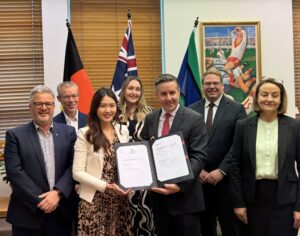Empowering pharmacists to meet Australia’s health needs
25 September 2024
Marking World Pharmacists Day today (25 September), Australia’s peak body for pharmacists the Pharmaceutical Society of Australia (PSA) reaffirms the key actions that form its flagship vision Pharmacists in 2030, highlighting the growing role of Australia’s pharmacists in meeting health needs.
Pharmacists around Australia and the world are responding to health challenges every day. Whether this be improving access to essential medicines, vaccination services and health advice, or optimising medicine use for safety and efficacy, pharmacists are on the frontlines of Australia’s health care system every day.
Last month PSA released Pharmacists in 2030, mapping the direction of the pharmacy profession over the coming years. Pharmacists in 2030 further identifies the key areas for reform in both practice and workforce development necessary to meet the health challenges of the future.
Pharmacists in 2030 continues a strong focus on medicine safety and improving access to care and medicines, also building an increased focus on patient equity, sustainability and supports which empower pharmacists to be the best they can be.
PSA National President Associate Professor Fei Sim FPS said that the future PSA sees further harnesses the potential of pharmacists.
“Australians need the expertise of pharmacists more than ever before,” Associate Professor Sim said. “As medicine use continues to grow and our population ages, Australian health needs are becoming more complex.”
“PSA sees pharmacists in all areas of practice doing more to meet these health challenges, and supported to do more for their patients or the communities they serve.
“By 2030, we see community pharmacy formally recognised as a preventive and primary health care hub where pharmacists are appropriately funded to practise to full and top of scope and play a greater role in preventive health care, treatment of acute illnesses and management of chronic health conditions – particularly through an increased prescribing role.
“While most community pharmacies will remain broad in their health offering to the community, some will become more specialised and focused to meet specific needs.
“Many of these changes are already well underway with various scope of practice pilots and changes occurring in every state and territory. These innovations and initiatives have been driven by real patient need and health system demand.
“We also see the need for pharmacists wherever medicines are prescribed, dispensed, administered or reviewed. This means playing a bigger role in multidisciplinary health care teams.
“Some of these roles will be relevant to community pharmacists, particularly in outreach services, others will see pharmacists embedded in these teams, often being a key conduit to reduce medicine safety risks in liaison with a patient’s community pharmacy.
“To the 38,000 pharmacists practising around the country, make sure you take a moment to celebrate your contribution to the health and wellbeing of your community this World Pharmacy Week and particularly today on World Pharmacists Day. On behalf of PSA, thank you for all that you do,” Associate Professor Sim concluded.
Media contact: Georgia Clarke M: 0480 099 798 E: georgia.clarke@psa.org.au

